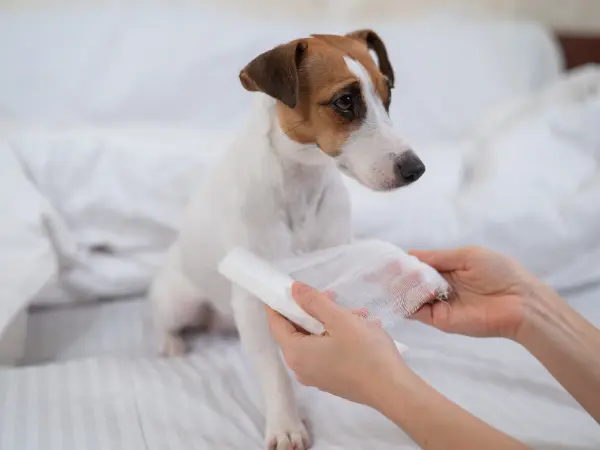Welcoming a new kitten into your home is an exciting and heartwarming experience. These tiny bundles of energy not only bring joy but also require special care, especially when it comes to their diet.
Many pet parents wonder: “What can kittens eat?” This Sploot Vets guide is here to provide answers! Whether you’re socializing your kitten, bonding through play, or simply rewarding good behavior, this guide talks about the best kitten treats, exploring both store-bought and homemade options.
Overview:
- Because kittens have sensitive stomachs, it is best to carefully consider each treat they’re given. When in doubt, consult your veterinarian.
- Generally, kitten treats should NOT BE more than 10 percent of a kitten’s daily calories.
- Kitten treats are not a substitute for healthy, AAFCO-approved kitten food.
- There are certain foods (e.g., milk, cheese, hot dogs) that intuitively seem like safe kitten treats but actually pose risks to their health.

I. When Can Kittens Have Treats?
Typically, kittens can start having treats after they’ve fully transitioned to solid food, which is at around 8 weeks of age. However, kittens can have different rates of development, which can be influenced by their breed, their nutrition, and other factors. Therefore, though there are general guidelines, it is always best to get personalized recommendations from your veterinarian.
Note: The best time to give your kitten treats and what kitten treats to start with are points you can go over during your kitten’s wellness exam. We recommend this for all kittens after they are brought home. Kitten exams serve as the foundation for ongoing personalized preventive care.
II. What Can Kittens Eat?
There are two main categories of kitten treats to consider: store-bought or commercial options and homemade kitten treats that you can prepare yourself.
A. Store-Bought or Commercial Kitten Treats
When purchasing store-bought treats, make sure to get those that are appropriate for your kitten’s age. A few of the most popular choices include:
- Puree tubes – these lickable treats are delicious, hydrating, and gentle on a kitten’s baby teeth. These are a great option for younger kittens (before 3 months of age), once cleared by your vet. In Fear Free vet clinics and shelters, this kitten treat is commonly used to keep a kitten calm during procedures or during kitten socialization to reward good behavior.
- Bite-sized treats – these are often small, kibble-like kitten treats that are either soft chews or crunchy. Soft chews can be given to younger kittens (less than 6 months old). Meanwhile, crunchy kitten treats are often best for kittens that already have their permanent teeth (i.e., older than 6 months).
Note: Though some believe that crunchy kitten treats can be used to alleviate teething (~ 3 to 6 months of age), this comes with the risk of overfeeding. To relieve teething in kittens, it is best to provide a safe, kitten-friendly chew toy with NO choking hazards.
The disadvantage of commercial kitten treats is that they are a mixture of ingredients. For kittens that have sensitive stomachs, this can be an issue. In addition, treats made with a mixture of proteins also have a higher risk of triggering allergies.
B. Homemade Kitten Treats
Some pet parents prefer homemade kitten treats as a healthier alternative. For some, this may also be the more budget-friendly option. Homemade kitten treats can be made with ingredients like chicken, fish, eggs, and so on. These are human foods, cooked in a specific way, so that they can deliver the most benefits for growing kittens.
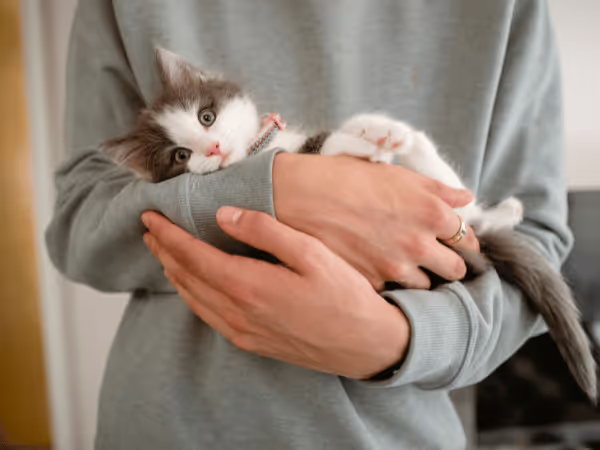
III. Can Kittens Eat Human Food As Treats?
Yes, kittens can eat certain human foods as occasional treats. However, we recommend avoiding sharing from your plate. People food typically contains seasonings and added fat, which are NOT good for kittens.
If you’d like to share human food with your kitten, you can consider the following homemade kitten treats:
1. Can Kittens Eat Eggs?
Yes, kittens can eat eggs. As a kitten treat, eggs offer plenty of protein and essential amino acids, which contribute to your furry friend’s growth and development.
Here’s how to prepare eggs as a kitten treat:
- Mode of cooking: Scrambled, NO seasoning. Avoid raw eggs due to the risk of salmonella.
- Amount: Limit the quantity to less than 10 percent of their daily caloric intake.
- Allergen alert—not a common cat allergy, but still possible. Avoid over-exposure to be on the safe side.
2. Can Kittens Eat Chicken or Turkey?
Yes, kittens can eat chicken or turkey in moderation. Chicken and turkey are considered “lean protein”, meaning they contain a high amount of protein and a relatively low amount of fat; this ratio helps support muscle growth with a reduced risk of excess weight gain.
Here’s how to safely prepare kitten treats from chicken or turkey.
- Mode of cooking: Boiled or baked, NO seasonings. Remove the skin and bones.
- Amount: For young kittens, small shreds only. Limit the overall quantity to less than 5 percent of their daily caloric intake.
- Allergen alert—a common cat allergy. Only give this treat occasionally, as over-exposure increases the risk of developing allergies.
3. Can Kittens Eat Tuna & Other Types of Fish?
Yes, kittens can eat tuna as well as other types of fish (e.g., salmon, cod). These proteins are rich in omega-3 fatty acids, which support brain and vision development. Omega-3 also contributes to their skin and coat health. However, make sure to AVOID canned fish, especially those with additives like oil or spices, as these are NOT safe for kittens.
Here’s how you can prepare kitten treats using tuna and other types of fish:
- Mode of cooking: Boiled or baked, NO seasonings. Make sure to carefully remove all the bones, scales, and skin. If canned, opt for “canned in water” options with NO ADDITIVES.
- Amount: For young kittens, small shreds only. Limit the overall quantity to less than 5 percent of their daily caloric intake.
- Allergen alert—a common cat allergy. Only give this treat occasionally, as over-exposure increases the risk of developing allergies
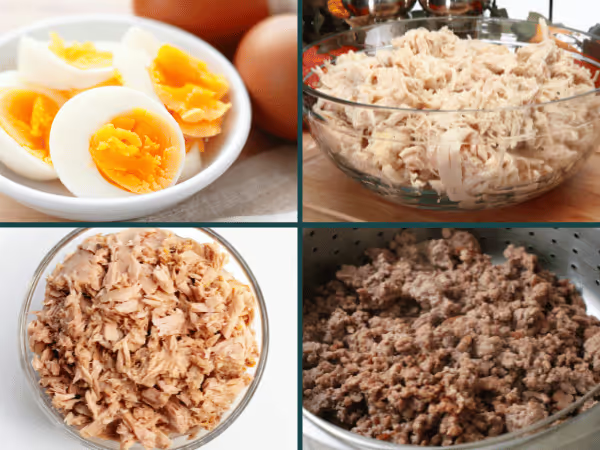
4. Can Kittens Eat Beef?
Yes, in moderation and with the right food preparation, kittens can eat beef. Beef is a great source of high-quality protein and iron, which helps support a kitten’s muscle development, red blood cell production, and overall growth during their critical early life stages. However, beef is one of the toughest proteins to digest; therefore, proper preparation is important.
Here’s how you can prepare beef as treats for your kitten:
- Mode of cooking: Ground for digestibility and baked, NO seasonings. DO not include any bones.
- Amount: For young kittens, small quantities only. Limit the overall quantity to less than 5 percent of their daily caloric intake.
- Allergen alert—a common cat allergy. Only give this treat occasionally as over-exposure increases the risk of developing allergies.
5. Can Kittens Eat Oatmeal?
Yes, kittens can eat oatmeal as a treat. Oatmeal can offer some benefits like digestible fiber, B vitamins, and iron, which help support digestion, neurological development, and red blood cell production, respectively. However, not all kittens like oatmeal; this kitten treat is not as generally palatable as animal proteins or some vegetables.
If you’d like to try serving oatmeal as a treat for your kitten, here’s how:
- Mode of cooking: Cook it thoroughly in water (not milk, which can cause digestive issues). AVOID adding sugar, salt, butter, or flavorings. Allow the oatmeal to cool before serving.
- Amount: Limit the overall quantity to less than 10 percent of their daily caloric intake.
- Allergen alert—not a common cat allergy, but still possible in a few cases, wherein cats become allergic to grain. Avoid over-exposure to be on the safe side.
6. Can Kittens Eat Broccoli?
Yes, kittens can eat broccoli in small amounts. Though kittens and cats do not rely on vegetables for nutrition, broccoli can be offered as an occasional high-fiber treat, which can help with digestive issues. Broccoli also contains vitamin C and other antioxidants that support the immune system and cellular health.
Here’s how you can prepare kitten treats using broccoli:
- Mode of cooking: Steamed and pureed for digestibility, NO seasonings.
- Amount: Limit the overall quantity to less than 10 percent of their daily caloric intake.
- Allergen alert—not a common cat allergy like proteins and grains, but still possible in EXTREMELY RARE cases. Avoid over-exposure to be on the safe side.
7. Can Kittens Eat Carrots?
Yes, kittens can eat carrots occasionally, as long as the carrots are prepared properly. Carrots are rich in beta-carotene (vitamin A), which helps support vision and immune function. However, carrots are not typically popular among kittens; this vegetable is not as savory as broccoli and nowhere near as preferred as protein-based treats.
If you’d like to try serving carrots as a low-calorie, healthy treat for your kitten, here’s how:
- Mode of cooking: Boiled till soft and pureed for digestibility, NO seasonings.
- Amount: Limit the overall quantity to less than 10 percent of their daily caloric intake.
- Allergen alert—not a common cat allergy like proteins and grains, but still possible in EXTREMELY RARE cases. Avoid over-exposure to be on the safe side.
8. Can Kittens Eat Pumpkin?
Yes, kittens can have pumpkin as an occasional treat. Pumpkins are an excellent source of fiber, which can help with mild constipation or diarrhea. However, the overall taste of pumpkin is sweet, a flavor that cats and kittens cannot taste. Still, some cats and kittens enjoy pumpkin when prepared properly.
If you’d like to try making homemade kitten treats with pumpkin, here’s how:
- Mode of cooking: Boiled and pureed for digestibility, NO seasonings.
- Amount: Limit the quantity to less than 10 percent of their daily caloric intake.
- Allergen alert—not a common cat allergy like proteins and grains, but still possible in EXTREMELY RARE cases. Avoid over-exposure to be on the safe side.
9. Can Kittens Eat Watermelon?
You may have seen videos online showing cats eating (and enjoying) watermelon. If this is something you’d like to try with your kitten, the good news is that watermelon is relatively safe for kittens, as long as it’s given in tiny amounts.
Watermelon provides hydration and has a relatively low sugar content, helping prevent sugar spikes that can happen with other sweeter fruits. Watermelon also contains vitamins A and C, which are antioxidants that help support immune health and cellular function.
If you’d like to prepare kitten treats using watermelon, here’s how:
- Mode of preparation: Remove all the seeds and the rind, and cut into very tiny pieces.
- Amount: Limit the quantity to less than 10 percent of their daily caloric intake.
- Allergen alert—not a common cat allergy like proteins and grains, but still possible in EXTREMELY RARE cases. Avoid over-exposure to be on the safe side.

IV. Unsafe Human Foods for Kittens
There are other foods that may seem like intuitively good choices as kitten treats, but are actually risky or unsafe for kittens.
1. Can Kittens Have Milk?
Though depicted in movies and cartoons as a cat’s favorite drink, milk poses risks for most cats and kittens. Most kittens become lactose intolerant after weaning. Therefore, milk can cause diarrhea and bloating.
2. Can Kittens Eat Cheese?
Most cheeses contain lactose and added salt, which can lead to stomach issues in kittens, especially since many cats become lactose intolerant after weaning.
3. Can Kittens Eat Peanut Butter?
Though dogs love an occasional peanut butter treat now and then, this is not recommended for cats and kittens. Peanut butter has NO nutritional benefits for cats. In addition, the risk of xylitol poisoning, choking, and sugar spikes isn’t worth it.
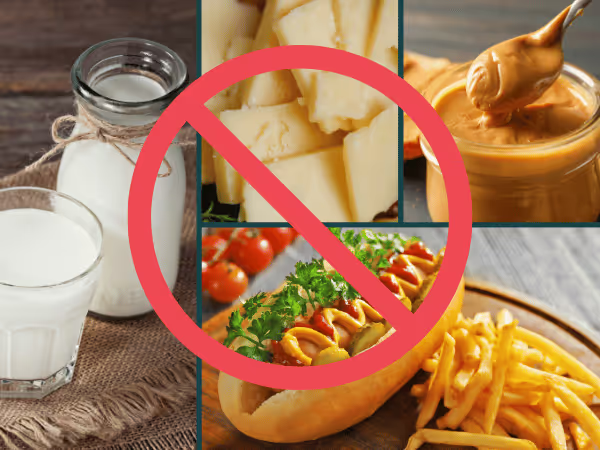
4. Can Kittens Eat Hot Dogs, Sausages, & Other Deli Meats
Though kittens love meat, processed meat is not beneficial for them. Processed meats like hot dogs, sausages, and deli meats often contain preservatives, seasonings, and nitrates that can be harmful or even toxic to kittens.
5. Can Kittens Have French Fries, Chips, & Other Processed Snacks?
Sometimes, there’s nothing more tempting than sharing comfort food with an adorable kitten; however, most human snacks do NOT offer any nutritional value for them. In addition, fries, chips, and other salty snacks can have too much fat and salt, potentially causing stomach upset and kidney issues in our feline companions.
Final Reminders on Kitten Care
This wraps up our guide on how to select and prepare the best kitten treats. However, this is just one aspect of overall kitten care. Here are additional, vet-approved resources you can check out:
- 6 Best Kitten Food for All Breeds: Wet & Dry Food →
- How to Take Care of a New Kitten 101: The 1st Year →
- How to Socialize a Kitten - with Humans & Other Pets→
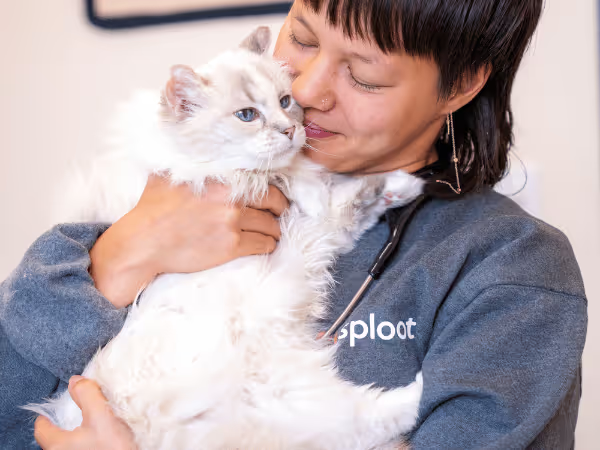
Get Complete Kitten Vet Care at Sploot Vets
If you have any questions about your kitten’s health, we’re here to help!
Sploot Veterinary Care offers all-in-one vet care for your kitten. Whether you need a nutritional consultation, kitten vaccinations, or other health concerns, we provide primary care, urgent care, and emergency vet services all under one roof.
In addition, our Fear Free certified medical team will help your kitten develop a positive association with vet visits—which is crucial during their early developmental stages.
Experience next-level vet care in our convenient clinic locations. Our modern veterinary clinics are open for extended hours, 365 days a year (including holidays!) You can easily schedule an appointment online or through the Sploot Vets app.
Boost Your Pet’s Wellness & Save With SplootPack™
Vet Care is now easier than ever. With the SplootPack™ membership, you can save up to $600+ on essential veterinary care—available in Sploot’s Denver and Chicago vet clinics.
Get 3 waived kitten exams or check-ups, exclusive discounts for spay/neuter procedures, 10% OFF on all Sploot’s services, and more!
- Learn more - SplootPack™ Denver →
- Learn more - SplootPack™ Chicago →


.avif)


